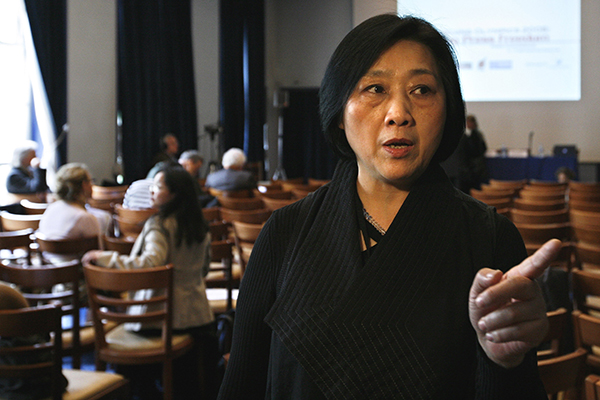Gao Yu was right, I was wrong. Gao, who was handed a seven-year prison sentence in a Beijing court on Friday, and I met at a conference organized by the World Association of Newspapers and News Publishers in Paris in April 2008, a few months before the Beijing Olympic Games were to get underway. CPJ had worked hard to publicize the mistake made by the International Olympics Committee in awarding China the Games in the first place.
We first released our 78-page report, “Falling Short: Olympic promises go unfulfilled as China falters on press freedom,” in 2007 and updated it in 2008. We took a hard public line, taking the IOC to task in public and private meetings. We warned that honoring China with the Games would only harden Beijing’s resolve to follow its anti-media policies, no matter what promises it had made to liberalize. China’s government refused to meet with us.
Gao had a similar position, one grounded in hard personal experience. She had already served more than five years in jail for a 1993 charge of revealing state secrets, and was released early in 1998. My notes from her presentation in Paris say she felt that China’s “turning point had yet to be reached, and things have become worse due to an accumulation of 60 years of [Communist Party] rule.”
But in private conversations I would admit to some degree of hope that China would loosen up after the Games ended and the visiting journalists had gone home. Though the government did follow through on some of its promises about Internet access and freedom for visiting journalists to report more freely, those permissions eventually melted away.
As happens at conferences like that, I met Gao in the restaurant of the hotel where we were all staying. I mentioned my feelings that China would benefit from hosting the Games, at least in terms of loosening some of the restrictions on media. She was quite frank when she told me I was deluding myself. China’s media policies were not going to change, and I was naïve to think that they would, or even that they could as long as the Communist Party was adamant about maintaining sole control of state power.
Seven years later, China has 44 journalists behind bars. In 2008, when Gao and I met, CPJ records showed 24 journalists in jail. In 1998, when Gao was released from her first jail term, there were at least 11 others in prison. The Xi Jinping government that replaced that of Hu Jintao is hell-bent on stifling critical media; the role of the press in China is to serve the Party, and nothing less. The official line is that humanitarian values, including press freedom, are being foisted on China by outsiders in an attempt to unseat the Party and pollute Chinese society.
Where is the proof that those are the government’s policies? In “Document 9,” the one that Gao was accused of sending to the U.S.-based Mingjing Magazine –a charge that she and the website’s publishers deny. Document 9 was a communiqué circulated within the Party by its General Office in April, 2013. Because of its strong stance and harsh tactical recommendations, it was quickly bootlegged and distributed widely among China watchers outside the Party. Really, releasing the document wasn’t necessary. Given China’s increasingly suffocated press and the number of people behind bars, you can easily see its policies being put into practice. [The Asia Society website ChinaFile has a wonderful translation of Document 9, officially titled “Communiqué on the Current State of the Ideological Sphere.” It makes chilling reading if you can make your way through the bureaucratese.]
In July in Kuala Lumpur this year, the IOC will announce its decision on which country will be awarded the 2022 Winter Olympic Games. Almaty, Kazakhstan and Beijing are the remaining candidate cities. It’s a devil’s choice: neither country is a paradigm of democracy, let alone press freedom. But from my point of view, giving China the Games again is a slap in the face to the growing number of journalists behind bars there, Gao Yu among them. And if past experience is an indicator, attaching conditions of expanded media freedoms or broadened human rights are expectations that will be met in name only. That approach did not work in 2008, and it will not work in 2022.
